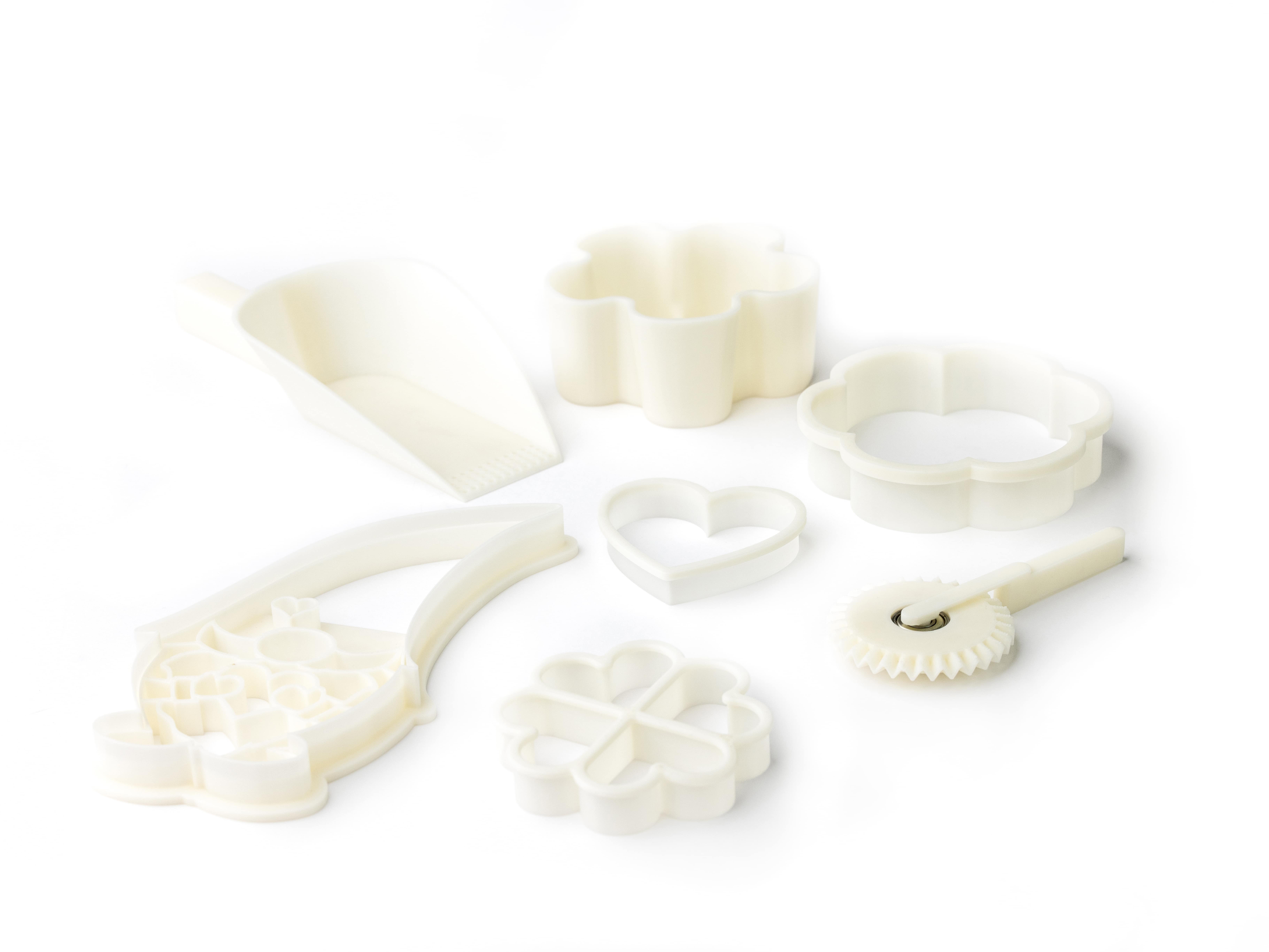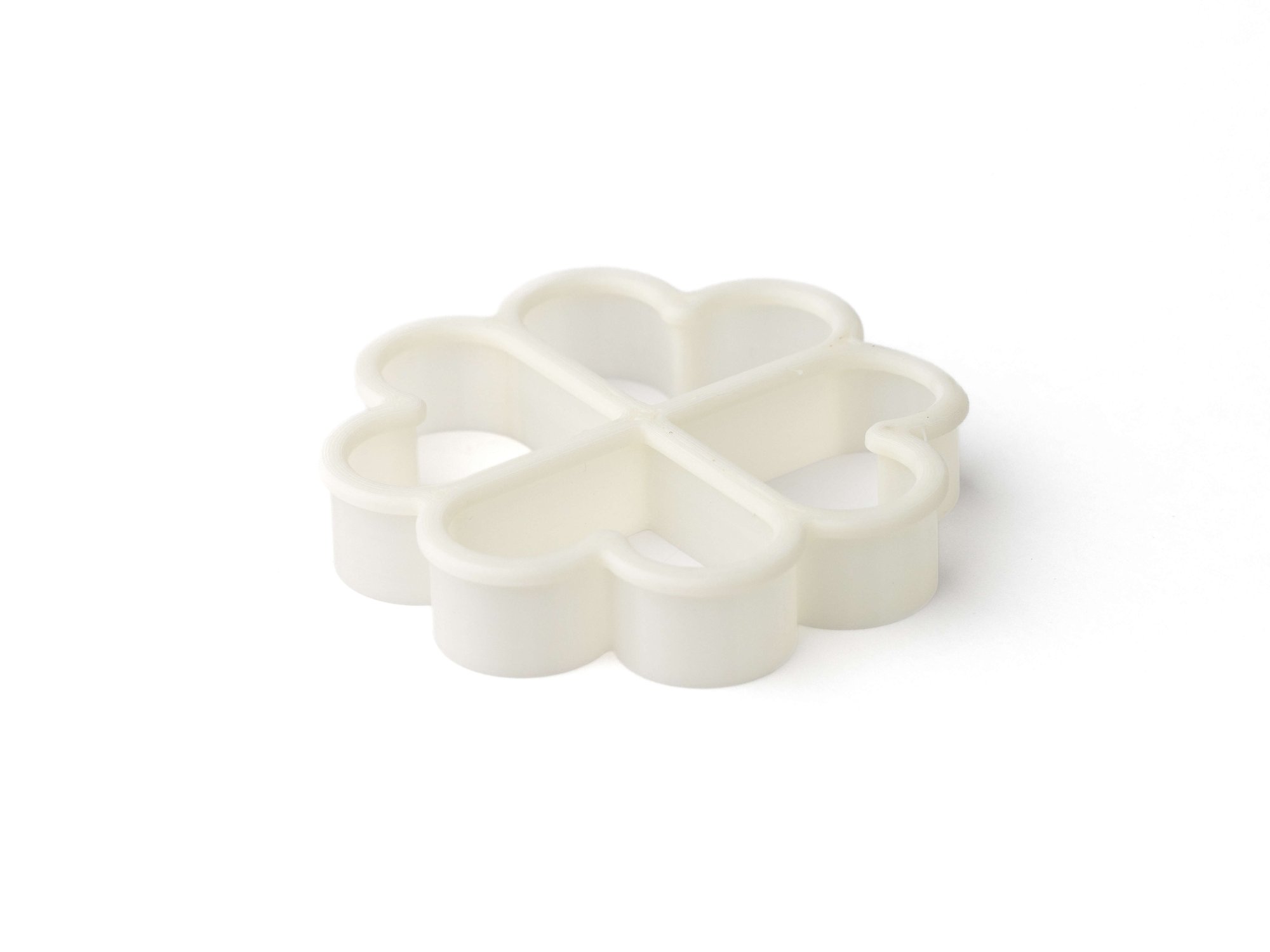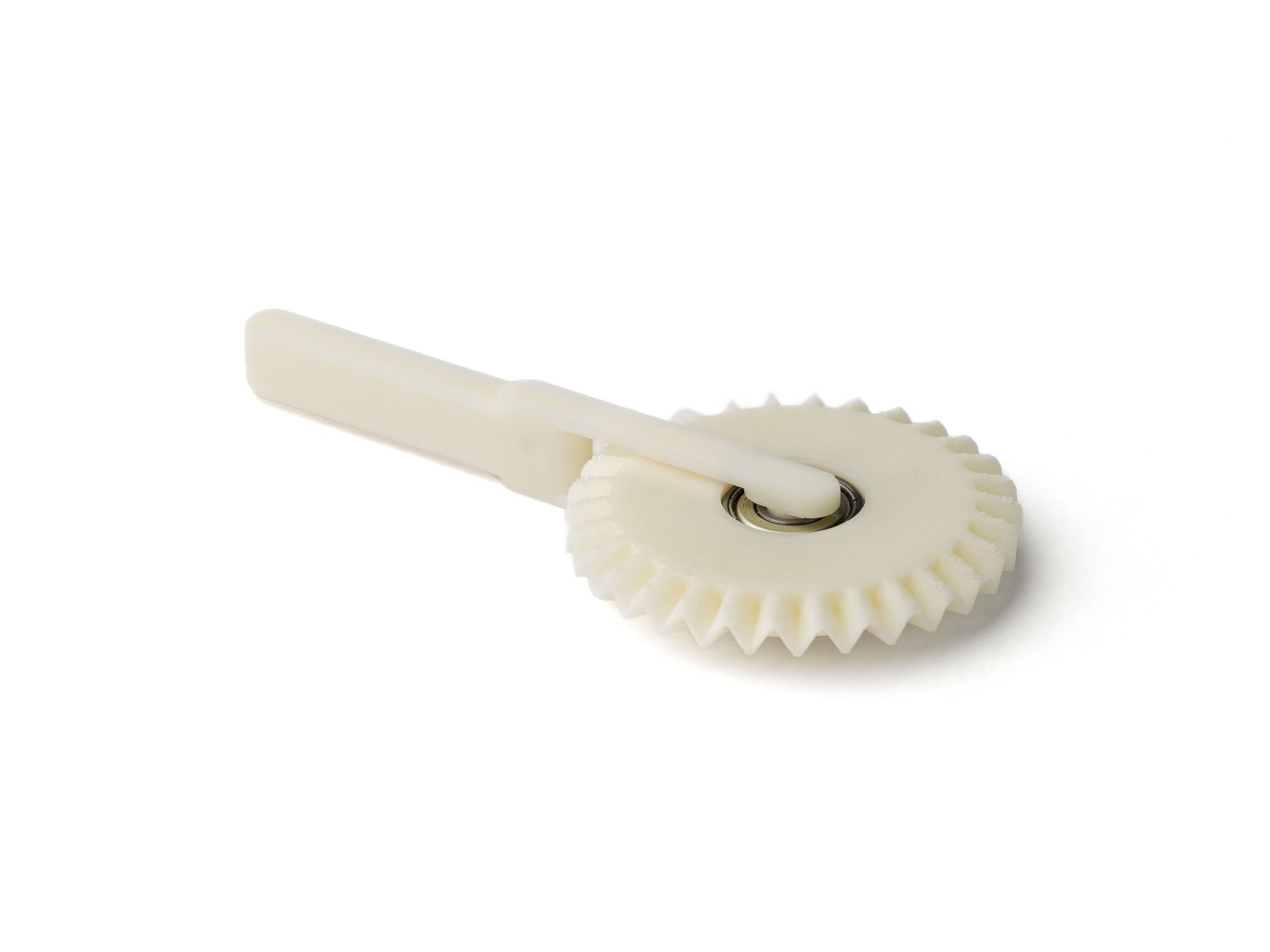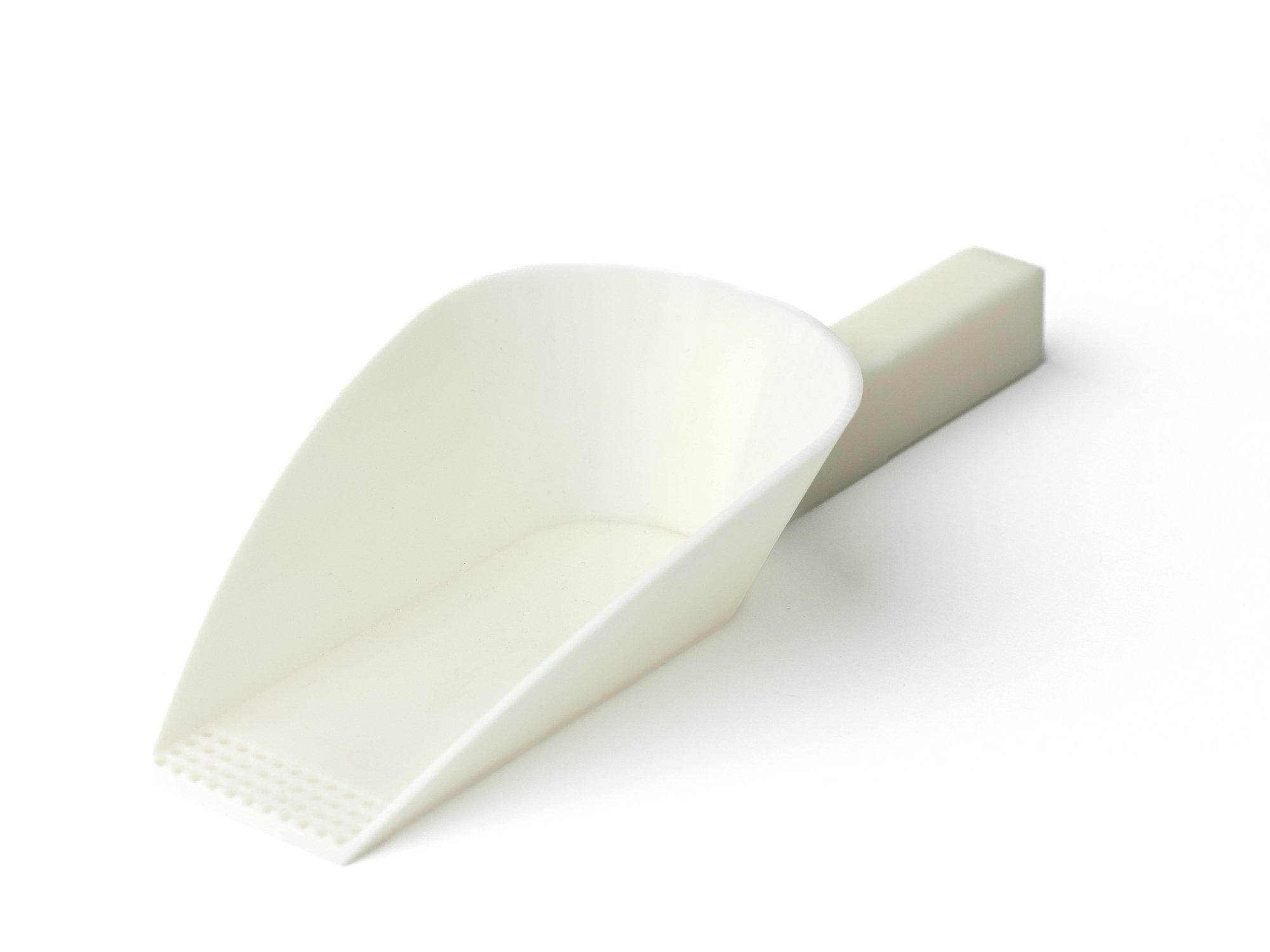ABS Food
ABS Food made for food use and using innovative FDM technologies in the room at a controlled temperature, meets the need for a material with the highest health certifications and thus able to be used in contact with foodstuff and beverages, for example in the production of household appliances.

PROS
- Certified for food contact
- Dishwasher and sterilisation possible
- Good temperature resistance
- Good mechanical strength and ductility
- Resistant to aqueous acids, phosphoric acid and hydrochloric acid
CONS
- Only available in 'natural' colour to maintain certification
- May turn yellow over time when exposed to UV and can be damaged
MAIN FEATURES
- 3D printing process: FDM
- Tolerance: 0,6mm<100mm; 0,75%>100mm
- Max size: 250 x 250 x 250 mm; 9,8 x 9,8 x 9,8 in
- Lead time: <3 days
ABS FOOD 3D PRINTED GALLERY
MAKE YOUR ABS FOOD PARTS NOW
Upload your 3D file now and get a free instant quote
ABS FOOD COMMENT
ABS Food, manufactured using the latest FDM printing technology and produced in a temperature-controlled environment, stands out as an advanced solution that satisfies the highest standards of health certifications. This material is specially designed to be used in contact with food and beverages, ensuring safety and compliance in the most sensitive areas.
Pros
Certified for Food Contact: ABS Food's primary strength lies in its official certification for food contact, underlining its commitment to maximum safety in food contact applications. This certification is the result of a rigorous controlled manufacturing process using the latest FDM printing technology. Ensuring compliance with food regulations is crucial, and this food grade material stands out as a choice that exceeds expectations in terms of safety and quality.
Dishwasher and Sterilisation: The versatility of ABS Food is manifested in its ability to withstand dishwasher and sterilisation. This characteristic makes it particularly suitable for utensils and household appliance components, where the need for thorough cleaning is essential. The combination of mechanical properties and resistance to intensive cleaning processes make it a reliable choice in contexts where hygiene is a priority.
Good Temperature Resistance: The good temperature resistance of this food grade plastic establishes it as a versatile material for multiple applications. Its ability to maintain stable mechanical properties even in variable temperature contexts allows for a wide range of uses. From domestic to industrial applications, food grade ABS offers reliable performance regardless of the temperature variations to which it may be subjected.
Good Mechanical Strength and Ductility: In addition to food safety and cleanliness characteristics, this ABS also offers good mechanical strength and ductility. This combination of mechanical properties makes it suitable for the production of components requiring strength and flexibility. Ductility is particularly valuable in applications where flexibility is required without compromising structural strength.
Resistant to Aqueous Acids, Phosphoric Acid and Hydrochloric Acid: Resistance to aqueous acids, phosphoric acid and hydrochloric acid further broadens the field of use of ABS Food. This characteristic is of particular importance in environments where exposure to chemicals is a constant. Its resilience to such chemicals makes it a reliable choice even in more challenging contexts, proving its versatility and adaptability in a variety of industrial and domestic applications.
Cons
Only Available in 'Natural' Colour to Preserve Certification: An important consideration in the adoption of this food-grade ABS plastic is its availability only in the 'natural' colour, which is necessary to preserve health certifications. This choice aims to ensure maximum safety and compliance with strict food standards. However, for those looking for more varied design options, this aesthetic limitation could be seen as a downside, limiting aesthetic and customisation choices.
Yellowing and Damage Over Time when Exposed to UV: One aspect to be taken into account is the potential yellowing and damage of food grade ABS over time, especially when exposed to UV light. This phenomenon is an inherent characteristic of many plastics, and in the case of ABS Food, it is important to consider applications that require extended aesthetic durability and are exposed to sunlight. Evaluation of this aspect becomes crucial in situations where yellowing resistance and aesthetic stability are priorities, such as in long-term design projects or display applications.
Applications of ABS food
Production of Kitchen Equipment: This ABS emerges as a first-rate choice for the production of kitchen utensils, where safety and hygiene are of paramount importance. The combination of health certifications and excellent mechanical properties makes it suitable for the manufacture of utensils such as ladles, spatulas and chopping boards, guaranteeing safety and durability in culinary applications.
Food Packaging Materials: In the food packaging sector, ABS Food proves to be a versatile solution. Its compliance with food regulations and mechanical strength make it suitable for the production of containers to store food safely and efficiently. The possibility of dishwasher and sterilisation confirms the material's practicality in everyday applications.
Components for Household Appliances: Food-grade ABS plastic is widely used in the production of components for household appliances. Its safety and durability characteristics make it ideal for internal or external parts of household appliances such as blenders, toasters and coffee machines. Its versatility helps ensure that appliances maintain high performance over time.
Design and Prototyping: In addition to traditional areas, food-grade ABS plastic is also used in design and prototyping. Its machinability and strength enable designers and engineers to create prototypes of food products and kitchen utensils efficiently. The ability to translate creative ideas into functional prototypes offers a significant advantage during the early stages of new product development, allowing shapes and functionality to be evaluated before large-scale production.
Conclusion
In conclusion, ABS Food stands as a state-of-the-art solution that fulfils the highest standards of sanitary certifications, making it the ideal choice for applications requiring safety and compliance in the most challenging sectors. Its official certification for food contact, achieved through a controlled manufacturing process and state-of-the-art FDM printing technology, confirms its commitment to the highest safety and quality.
ABS Food's strengths, including its dishwasher and sterilisation capability, good temperature resistance, mechanical strength and ductility, together with its resistance to chemicals, make it a versatile choice in a wide range of applications. From food to kitchen tools, this ABS adapts to the needs of different sectors, helping to ensure safety and quality.
However, it is crucial to consider some negative aspects, such as the limited availability of colours to maintain certifications and the possibility of yellowing and damage over time, especially in the presence of UV light. These aspects may influence the choice of material according to specific aesthetic and durability requirements.
Ultimately, ABS Food is confirmed as a versatile, safe and reliable material, suitable for many industrial and everyday applications where safety, quality and regulatory compliance are essential.
MATERIAL PROPERTIES
| Tensile breaking load | 44 MPa |
| Modulus of elasticity | 1450 MPa |
| Elongation at break | 6% |
| Flexural modulus | 76 MPa |
| HDT 0.45 MPa | 83 ºC |
| Izod impact resistance | 17 kJ/m² |
At Weerg, we pride ourselves on providing fast, reliable and amazing customer service. We believe that this is what distinguishes great companies from others.
Questions and Answers
Yes, food-grade ABS is a specific type of ABS certified for food contact, complying with European and US regulations. This material is designed to meet the hygiene requirements necessary for food use. It is important to exclusively use food-grade ABS for applications where components come into direct contact with food or beverages, as it ensures safety and does not release harmful substances. However, its safety also depends on compliance with the production process and the potential use of uncertified additives.
ABS (Acrylonitrile Butadiene Styrene) is a thermoplastic material widely used due to its combination of toughness, impact resistance, and workability. It is lightweight, durable, and can be 3D printed or processed using other techniques, making it suitable for a variety of applications. This material is known for its versatility and is employed in industries such as electronics, automotive, and industrial design. In the case of food-grade ABS, the material is modified to ensure safety for direct contact with food while maintaining its primary technical characteristics.
ABS plastic does not have a sharply defined melting point as it is an amorphous material, but its processing typically occurs between 200°C and 250°C. The glass transition temperature, at which the material begins to soften, is around 105°C. This range makes ABS suitable for applications requiring good thermal resistance, but it is important to avoid exposure to temperatures above its operational limit, as it may deform or lose its mechanical properties.
QUOTE IN 3 SECONDS WITHOUT COMMITMENT
Do you want to turn your 3D project into reality?
Upload your 3D file to get one step closer to manufacturing your parts.


